- Home
- Virginia Woolf
A Writer's Diary: Being Extracts From the Diary of Virginia Woolf
A Writer's Diary: Being Extracts From the Diary of Virginia Woolf Read online
A Writer's Diary
Being Extracts from the Diary of Virginia Woolf
Virginia Woolf
* * *
Edited by Leonard Woolf
A Harvest Book • Harcourt, Inc.
San Diego New York London
* * *
Copyright 1954, 1953 by Leonard Woolf
Copyright renewed 1982, 1981 by
Quentin Bell and Angelica Garnett
All rights reserved. No part of this publication may be
reproduced or transmitted in any form or by any means,
electronic or mechanical, including photocopy, recording,
or any information storage and retrieval system, without
permission in writing from the publisher.
Requests for permission to make copies of any
part of the work should be mailed to the following
address: Permissions Department, Harcourt, Inc.,
6277 Sea Harbor Drive, Orlando, Florida 32887-6777.
Library of Congress Cataloging-in-Publication Data
Woolf, Virginia (Stephen) 1882–1941.
A writer's diary.
1. Woolf, Virginia (Stephen) 1882–1941.
I. Title.
[PR6045.072Z5 1973] 828'.9'1203[B] 73–5737
ISBN 0-15-602791-7
Printed in the United States of America
E G I J H F
* * *
CONTENTS
PREFACE vii
GLOSSARY OF NAMES USED IN THE DIARY xi
1918 1
1919 7
1920 22
1921 29
1922 41
1923 54
1924 61
1925 70
1926 84
1927 102
1928 120
1929 138
1930 149
1931 161
1932 173
1933 186
1934 208
1935 228
1936 254
1937 265
1938 278
1939 299
1940 311
1941 348
GENERAL INDEX 353
INDEX OF BOOKS 355
* * *
PREFACE
In 1915 Virginia Woolf began regularly to write a diary. She continued to do so until 1941 and the last entry is four days before her death. She did not write it regularly every day. There are sometimes entries daily for several days; more usually there is an entry every few days and then there will perhaps be a gap of a week or two. But the diary gives for 27 years a consecutive record of what she did, of the people whom she saw, and particularly of what she thought about those people, about herself, about life, and about the books she was writing or hoped to write. She wrote it on blank sheets of paper (8¼″ by 10½″, i.e. technically large post quarto). At first the sheets were clipped together with loose-leaf rings, but all the later diaries are in bound volumes. We used to have the sheets bound up in paper over boards, and the cover paper is nearly always one of the coloured, patterned Italian papers which we frequently used for binding books of poetry published by us in The Hogarth Press and of which she was very fond. We used to buy the paper for the sheets and have it bound up in books ready for her to use, and she wrote her novels in this kind of book as well as her diary. When she died, she left 26 volumes of diary written in this kind of book in her own hand.
The diary is too personal to be published as a whole during the lifetime of many people referred to in it. It is, I think, nearly always a mistake to publish extracts from diaries or letters, particularly if the omissions have to be made in order to protect the feelings or reputations of the living. The omissions almost always distort or conceal the true character of the diarist or letter-writer and produce spiritually what an Academy picture does materially, smoothing out the wrinkles, warts, frowns, and asperities. At the best and even unexpurgated, diaries give a distorted or one-sided portrait of the writer, because, as Virginia Woolf herself remarks somewhere in these diaries, one gets into the habit of recording one particular kind of mood—irritation or misery, say—and of not writing one's diary when one is feeling the opposite. The portrait is therefore from the start unbalanced, and, if someone then deliberately removes another characteristic, it may well become a mere caricature.
Nevertheless the present book is composed of extracts from Virginia Woolf's diaries. She used her diary partly, in the normal way of diarists, to record what she did and what she thought about people, life, and the universe. But she also used it in a very individual way as a writer and artist. In it she communed with herself about the books she was writing or about future books which she intended to write. She discusses the day-to-day problems of plot or form, of character or exposition, which she encounters in each of her books as she conceives them or writes or revises them. Her position as an artist and the merits of her books are a subject of dispute, and no prudent man would claim to judge to a nicety the place which a contemporary writer will occupy in the pantheon of letters. Some critics are irritated and many less sophisticated readers are bewildered by her later novels. But no one denies that she was a serious artist and there are many people who, like Professor Bernard Blackstone, have no doubt that "she was a great artist," that "she did supremely well what no one else has attempted to do," and that her "world will survive as the crystal survives under the crushing rockmasses." * And it is relevant to what I have to say in this preface that many of the people who cannot understand or dislike or ridicule her novels agree that in The Common Reader and her other books of essays she showed herself to be a very remarkable literary critic.
I have been carefully through the 26 volumes of diary and have extracted and now publish in this volume practically everything which referred to her own writing. I have included also three other kinds of extract. The first consists of a certain number of passages in which she is obviously using the diaryas a method of practising or trying out the art of writing. The second consists of a few passages which, though not directly or indirectly concerned with her writings, I have deliberately selected because they give the reader an idea of the direct impact upon her mind of scenes and persons, i.e. of the raw material of her art. Thirdly I have included a certain number of passages in which she comments upon the books she was reading.
The book throws light upon Virginia Woolf's intentions, objects, and methods as a writer. It gives an unusual psychological picture of artistic production from within. Its value and interest naturally depend to a great extent upon the value and interest of the product of Virginia Woolf's art. Unless I had agreed with Professor Blackstone, I would not have edited and published this book. She was, I think, a serious artist and all her books are serious works of art. The diaries at least show the extraordinary energy, persistence, and concentration with which she devoted herself to the art of writing and the undeviating conscientiousness with which she wrote and rewrote and again rewrote her books.The Waves seems to me a great work of art, far and away the greatest of her books.To the Lighthouse and Between the Acts should also, I think, live in their own right, while the other books, though on a lower level of achievement, are, as I said, "serious" and will always be worth reading and studying. I put forward this opinion, not as of any value, but as an explanation of my publishing the book.
In editing the diary I was in some doubt whether to indicate omissions. In the end I decided not to do so as a general rule. The omissions and the dots would have been so continual as to worry the reader. This leads me to revert to what I said above. The reader must remember that what is printed in this v
olume is only a very small portion of the diaries and that the extracts were embedded in a mass of matter unconnected with Virginia Woolf's writing. Unless this is constantly borne in mind, the book will give a very distorted view of her life and her character.
Virginia Woolf does not always indicate in the diary where she is when she is writing it and it is rarely of much importance that the reader should know. The following facts will probably clear up any doubt in any particular case. From 1915 to March, 1924, we lived at Hogarth House, Richmond. This in the diary is often referred to simply as "Hogarth." At the same time we also had a lease of Asheham House, near Lewes, in Sussex, referred to in the diary simply as "Asheham." We used Asheham ordinarily only for week-ends and holidays. In 1919 the lease of Asheham House came to an end and we bought Monks House, Rodmell, near Lewes, moving into it in September, 1919. In 1924 we sold Hogarth House, Richmond, and took a lease of 52 Tavistock Square, W.C.i, often referred to in the diary as "Tavistock." We lived there from March, 1924, until August, 1939, when we moved to 37 Mecklenburgh Square, W.C. 1. In 1940 the house in Mecklenburgh Square was so badly damaged by bombs that all the furniture had to be removed and we lived until Virginia Woolf's death in 1941 at Monks House.
I append to this preface a glossary of names of persons used in the diary which will help the reader to understand who is being referred to in any particular passage.
LEONARD WOOLF
1 January, 1953
* * *
1918
Monday, August 4th
While waiting to buy a book in which to record my impressions first of Christina Rossetti, then of Byron, I had better write them here. For one thing I have hardly any money left, having bought Leconte de Lisle in great quantities. Christine has the great distinction of being a born poet, as she seems to have known very well herself. But if I were bringing a case against God she is one of the first witnesses I should call. It is melancholy reading. First she starved herself of love, which meant also life; then of poetry in deference to what she thought her religion demanded. There were two good suitors. The first indeed had his peculiarities. He had a conscience. She could only marry a particular shade of Christian. He could only stay that shade for a few months at a time. Finally he developed Roman Catholicism and was lost. Worse still was the case of Mr. Collins—a really delightful scholar—an unworldly recluse—a single-minded worshipper of Christina, who could never be brought into the fold at all. On this account she could only visit him affectionately in his lodgings, which she did to the end of her life. Poetry was castrated too. She would set herself to do the psalms into verse; and to make all her poetry subservient to the Christian doctrines. Consequently, as I think, she starved into austere emaciation a very fine original gift, which only wanted licence to take to itself a far finer form than, shall we say, Mrs. Browning's. She wrote very easily; in a spontaneous childlike kind of way one imagines, as is the case generally with a true gift; still undeveloped. She has the natural singing power. She thinks too. She has fancy. She could, one is profane enough to guess, have been ribald and witty. And, as a reward for all her sacrifices, she died in terror, uncertain of salvation. I confess though that I have only turned her poetry over, making my way inevitably to the ones I knew already.
Wednesday, August 7th
Asheham diary drains off my meticulous observations of flowers, clouds, beetles and the price of eggs; and, being alone, there is no other event to record. Our tragedy has been the squashing of a caterpillar; our excitement the return of the servants from Lewes last night, laden with all L.'s war books and the English review for me, with Brailsford upon a League of Nations, and Katherine Mansfield on Bliss. I threw down Bliss with the exclamation, "She's done for!" Indeed I don't see how much faith in her as woman or writer can survive that sort of story. I shall have to accept the fact, I'm afraid, that her mind is a very thin soil, laid an inch or two deep upon very barren rock. For Bliss is long enough to give her a chance of going deeper. Instead she is content with superficial smartness; and the whole conception is poor, cheap, not the vision, however imperfect, of an interesting mind. She writes badly too. And the effect was as I say, to give me an impression of her callousness and hardness as a human being. I shall read it again; but I don't suppose I shall change. She'll go on doing this sort of thing, perfectly to her and Murry's satisfaction. I'm relieved now that they didn't come. Or is it absurd to read all this criticism of her personally into a story?
Anyhow I was very glad to go on with my Byron. He has at least the male virtues. In fact, I'm amused to find how easily I can imagine the effect he had upon women—especially upon rather stupid or uneducated women, unable to stand up to him. So many, too, would wish to reclaim him. Ever since I was a child (as Gertler would say, as if it proved him a particularly remarkable person) I've had the habit of getting full of some biography and wanting to build up my imaginary figure of the person with every scrap of news I could find about him. During the passion, the name of Cowper or Byron or whoever it might be, seemed to start up in the most unlikely pages. And then, suddenly, the figure becomes distant and merely one of the usual dead. I'm much impressed by the extreme badness of B.'s poetry—such of it as Moore quotes with almost speechless admiration. Why did they think this Album stuff the finest fire of poetry? It reads hardly better than L. E. L. or Ella Wheeler Wilcox. And they dissuaded him from doing what he knew he could do, which was to write satire. He came home from the East with satires (parodies of Horace) in his bag and Childe Harold. He was persuaded that Childe Harold was the best poem ever written. But he never as a young man believed in his poetry; a proof, in such a confident dogmatic person, that he hadn't the gift. The Wordsworths and Keatses believe in that as much as they believe in anything. In his. character, I'm often reminded a little of Rupert Brooke, though this is to Rupert's disadvantage. At any rate Byron had superb force; his letters prove it. He had in many ways a very fine nature too; though as no one laughed him out of his affectations he became more like Horace Cole than one could wish. He could only be laughed at by a woman, and they worshipped instead. I haven't yet come to Lady Byron, but I suppose, instead of laughing, she merely disapproved. And so he became Byronic.
Friday, August 8th
In the absence of human interest, which makes us peaceful and content, one may as well go on with Byron. Having indicated that I am ready, after a century, to fall in love with him, I suppose my judgment of Don Juan may be partial. It is the most readable poem of its length ever written, I suppose: a quality which it owes in part to the springy random haphazard galloping nature of its method. This method is a discovery by itself. It's what one has looked for in vain—an elastic shape which will hold whatever you choose to put into it. Thus he could write out his mood as it came to him; he could say whatever came into his head. He wasn't committed to be poetical; and thus escaped his evil genius of the false romantic and imaginative. When he is serious he is sincere: and he can impinge upon any subject he likes. He writes 16 cantos without once flogging his flanks. He had, evidently, the able witty mind of what my father Sir Leslie would have called a thoroughly masculine nature. I maintain that these illicit kinds of book are far more interesting than the proper books which respect illusions devoutly all the time. Still, it doesn't seem an easy example to follow; and indeed like all free and easy things, only the skilled and mature really bring them off successfully. But Byron was full of ideas—a quality that gives his verse a toughness and drives me to little excursions over the surrounding landscape or room in the middle of my reading. And tonight I shall have the pleasure of finishing him—though why considering that I've enjoyed almost every stanza, this should be a pleasure I really don't know. But so it always is, whether the book's a good book or a bad book. Maynard Keynes admitted in the same way that he always cuts off the advertisements at the end with one hand while he's reading, so as to know exactly how much he has to get through.
Monday, August 19th
I finished by the way the Electra
of Sophocles, which has been dragging on down here, though it's not so fearfully difficult after all. The thing that always impresses me fresh is the superb nature of the story. It seems hardly possible not to make a good play of it. This perhaps is the result of having traditional plots which have been made and improved and freed from superfluities by the polish of innumerable actors and authors and critics, till it becomes like a lump of glass worn smooth in the sea. Also, if everyone in the audience knows beforehand what is going to happen, much finer and subtler touches will tell, and words can be spared. At any rate my feeling always is that one can't read too carefully, or attach enough weight to every line and hint; and that the apparent bareness is only on the surface. There does, however, remain the question of reading the wrong emotions into the text. I am generally humiliated to find how much Jebb is able to see; my only doubt is whether he doesn't see too much—as I think one might do with a bad modem English play if one set to work. Finally, the particular charm of Greek remains as strong and as difficult to account for as ever. One feels the immeasurable difference between the text and the translation with the first words. The heroic woman is much the same in Greece and England. She is of the type of Emily Bronte. Clytaemnestra and Electra are clearly mother and daughter, and therefore should have some sympathy, though perhaps sympathy gone wrong breeds the fiercest hate. E. is the type of woman who upholds the family above everything; the father. She has more veneration for tradition than the sons of the house; feels herself born of the father's side and not of the mother's. It's strange to notice how although the conventions are perfectly false and ridiculous, they never appear petty or undignified as our English conventions are constantly made to do. Electra lived a far more hedged in life than the women of the mid-Victorian age, but this has no effect upon her, except in making her harsh and splendid. She could not go out for a walk alone; with us it would be a case of a maid and a hansom cab.

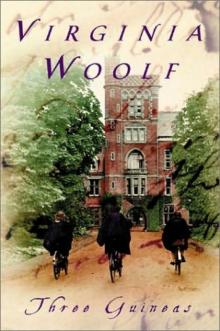 Three Guineas
Three Guineas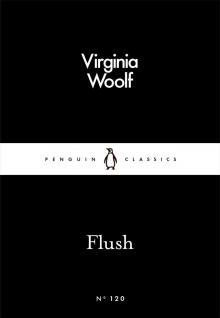 Flush
Flush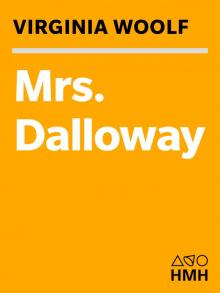 Mrs. Dalloway
Mrs. Dalloway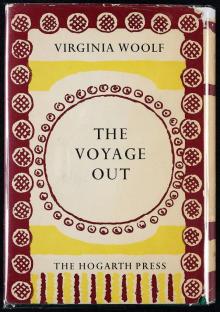 The Voyage Out
The Voyage Out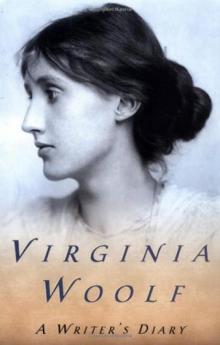 A Writer's Diary: Being Extracts From the Diary of Virginia Woolf
A Writer's Diary: Being Extracts From the Diary of Virginia Woolf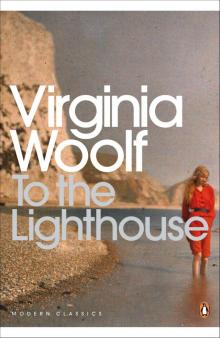 To The Lighthouse
To The Lighthouse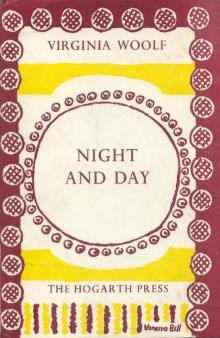 Night and Day
Night and Day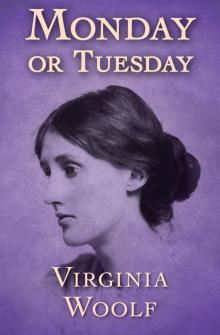 Monday or Tuesday
Monday or Tuesday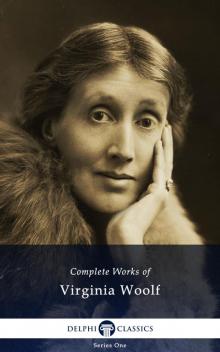 Complete Works of Virginia Woolf
Complete Works of Virginia Woolf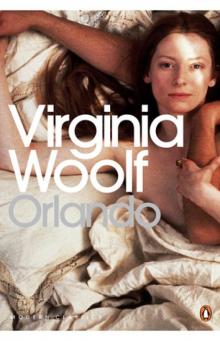 Orlando
Orlando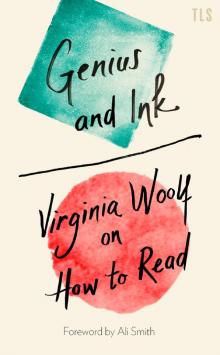 Genius and Ink
Genius and Ink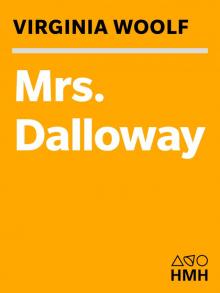 Mrs. Dalloway (Annotated)
Mrs. Dalloway (Annotated)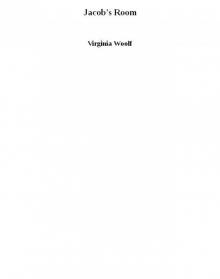 Jacob's Room
Jacob's Room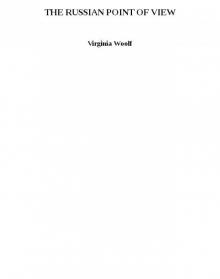 THE RUSSIAN POINT OF VIEW
THE RUSSIAN POINT OF VIEW A Writer's Diary
A Writer's Diary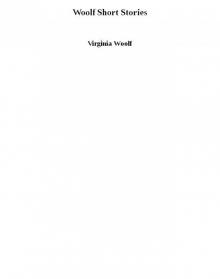 Woolf Short Stories
Woolf Short Stories